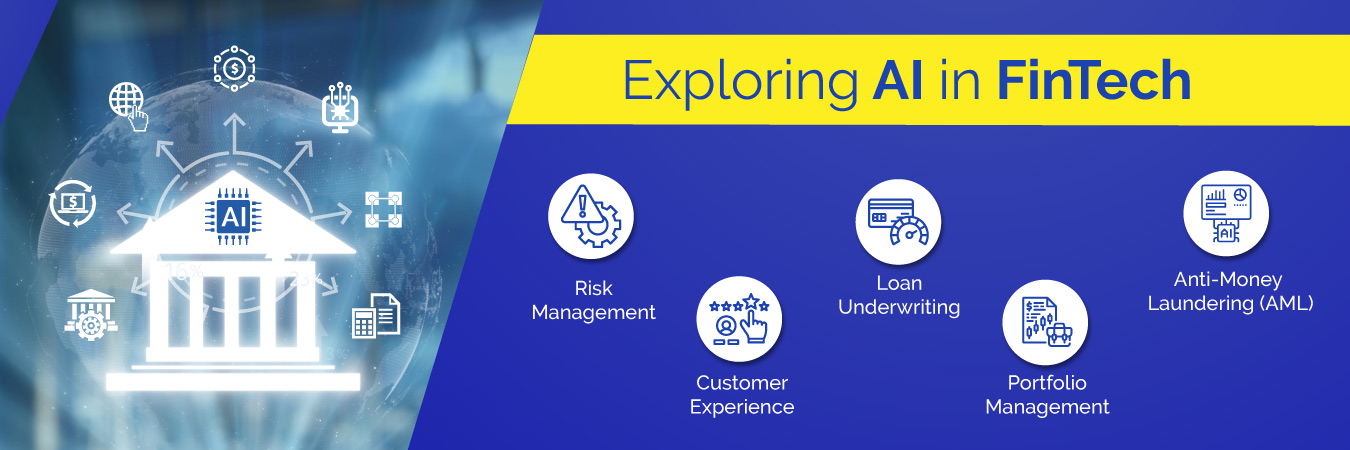
Exploring AI in FinTech: Key Roles, Opportunities and Use Cases
Are you a BFSI player looking to deliver more personalized offerings to your customers, transform their experiences, and compete strongly in the evolving spectrum?
Do you feel challenged by the entry of new and agile FinTech players?
Then, you must think differently and look beyond the technology you’ve been using already. You must explore AI in FinTech and experience its game-changing abilities.
AI in FinTech is experiencing unprecedented growth. By early next decade, experts project a revenue growth of nearly five times the current size.
However, what fuels this growth? Is it only capabilities? No. It is precisely the role AI plays and the outcome it delivers. Let’s explore them in this blog.
Key Roles of AI in FinTech
Let’s begin with exploring the key areas in which AI plays a role in FinTech.
1. Fraud Detection and Risk Management
Financial institutions are always on the radar of cybercriminals. The latter strives to innovate ways to exploit vulnerabilities and cut through the smallest gaps to steal confidential user data, digital assets, etc.
In a situation like this, AI helps the FinTech sector in various ways. It analyzes massive amounts of transactional data in real-time, identifies anomalies, and proactively flags potentially fraudulent activities.
On the other hand, Machine learning (ML) models learn from new threats, reducing false positives and enhancing security.
2. Personalized Banking and Customer Experience
Banking interactions aren’t just give-and-take transactions anymore. They are experiences. And your clients will expect you to deliver them as their banking partner!
AI-driven chatbots and virtual assistants help redefine customer interactions. They leverage NLP to provide personalized recommendations, resolve concerns instantly, and streamline the overall banking experience.
Additionally, AI enables hyper-personalization, helping FinTech companies analyze user behavior and offer highly customized financial products and services.
3. Credit Scoring and Loan Underwriting
Conventional credit scoring depends on historical data, usually restricting financial inclusion to only those who have it.
However, AI-driven credit risk models also assess alternative data sources like transaction history, online behavior, social signals, etc., to help BFSI players make more accurate and inclusive lending decisions.
Holistically, it can help revolutionize the concept of an inclusive economy by bringing borrowers from the underbanked or underprivileged sections of society.
4. Algorithmic Trading and Portfolio Management
AI-powered trading algorithms process massive amounts of market data, helping BFSI firms identify patterns and execute trades at optimal points in time. Such systems help reduce human biases, improve trading strategies, and enable informed investment decision-making, benefiting institutional and retail investors.
5. Regulatory Compliance and Anti-Money Laundering (AML)
For a financial firm, coping with regulatory compliance is usually overwhelming, particularly given the hundreds of other tasks it involves itself in.
However, AI helps automate compliance checks, monitors transactions for suspicious activities, and ensures adherence to regulations.
On the other hand, AI-powered AML solutions help BFSI firms and FinTech players detect illicit financial activities and keep up with regulatory requirements efficiently.
Opportunities for Financial Institutions
The adoption of AI in fintech presents enormous opportunities:
- Improved and Informed Decision-Making: AI provides real-time insights, enabling informed and data-driven decision-making across financial services.
- Cost Efficiency: The technology automates processes, helping BFSI players reduce operational costs, save time, expedite service, and improve efficiency.
- Customer Retention and Acquisition: Tailored recommendations and personalized AI-driven experiences enhance customer journeys, drive customer retention and help industry players acquire new users and accounts.
- Scalability: Business grows with time and so should the technology that supports it. AI adheres to this basic, yet crucial principle by scaling seamlessly. It helps financial firms expand their services and geographical reach without requiring a significant workaround or burning a hole in the pocket.
AI in FinTech Use Cases
AI has numerous real-world use cases, particularly in the FinTech context. Let’s look at some of them for a better understanding.
- AI-Powered Chatbots: Leading banks and FinTech firms use AI chatbots to expedite customer inquiries, and requests and reduce wait times. These chatbots are trained for an extensive amount of data and they improve with every interaction, thus providing quick, accurate, and multilingual responses that personalize the overall banking experience.
- Predictive Analytics in Wealth Management: Wealth management companies use AI-driven predictive analytics to offer personalized investment advice to their clients and help them optimize their portfolios.
- AI-Based Risk Assessment for Loans: Many lenders use AI-driven risk models to provide loans to people with limited credit history. AI helps them analyze their online behavior, banking history, etc., to assess the applicant’s credibility and repayment history.
Prepared to Harness the Power of AI in FinTech Industry ?
Partner with FidelSoft! A trusted partner in AI FinTech solutions, we serve FinTech players of varying business sizes, markets, and regions worldwide.
Our bespoke and scalable AI FinTech solutions aim to help increase productivity, automate operations, enhance the overall customer experience, and enable BFSI players to evolve and compete efficiently.
Want to explore how AI in FinTech can help unlock growth potential and opportunities? Email us at sales@fidelsoft.com and navigate the world of AI with our seasoned experts.
Ref. No – FB03251002
